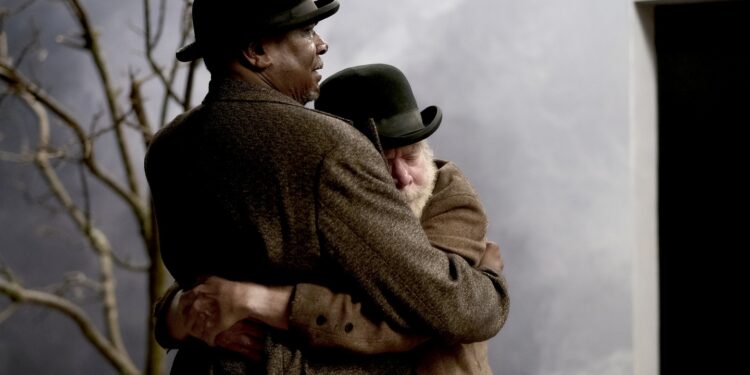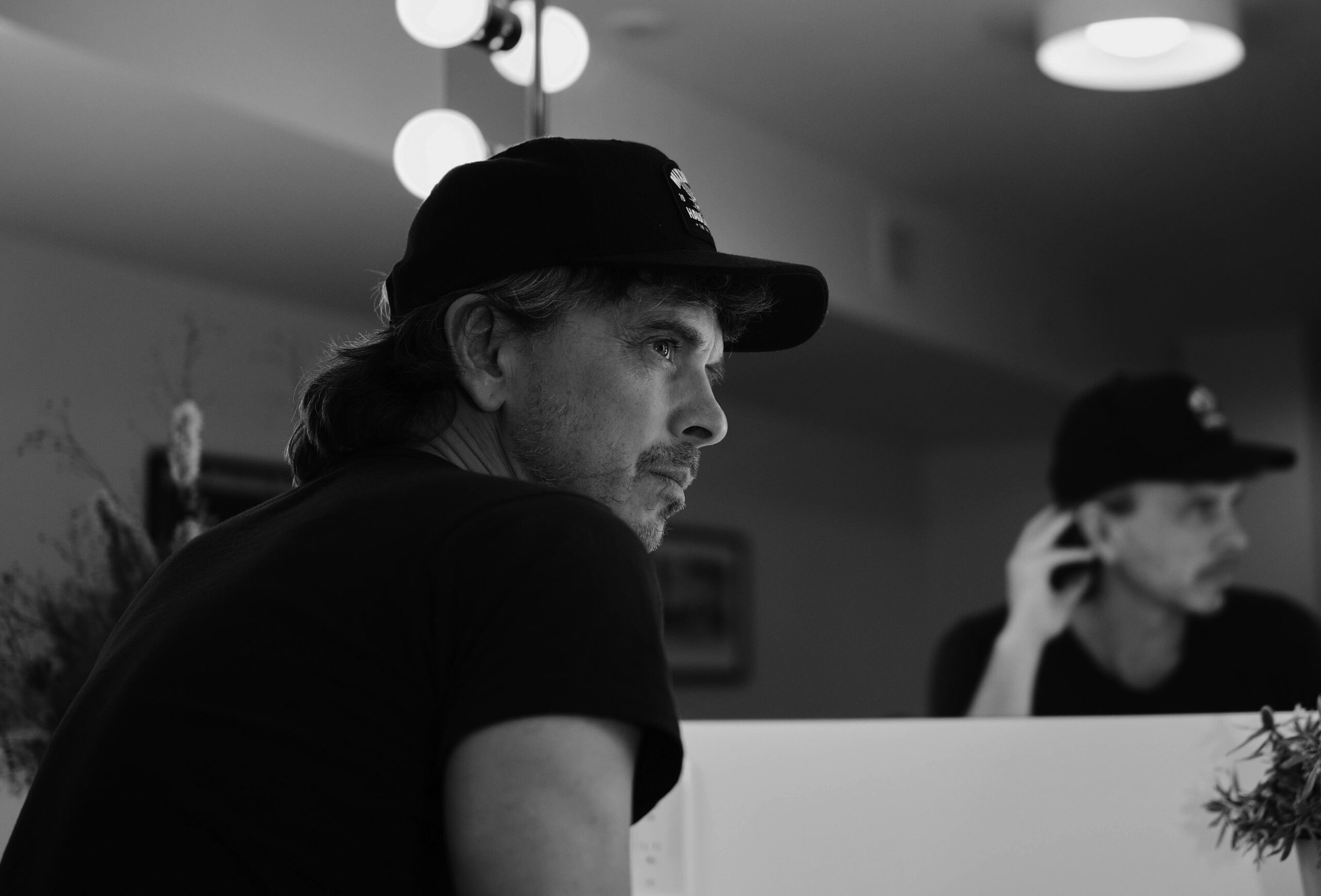A 72-year-old Samuel Beckett performance masterclass that still remains impressively enigmatic. Alexander Thomas and Ted Dykstra lead an outstanding cast that highlights the play’s wit, humour, and pathos. One of the shows not to miss this fall in Toronto.
Estragon (Ted Dykstra) and Vladimir (Alexander Thomas) spend their days waiting for someone named Godot. They believe that the unseen individual will arrive and change their current circumstances. To pass the time, Estragon and Vladimir engage in conversations that range from random thoughts and philosophical musings about life to sharing their own experiences that have led them to this moment. Several times, the two men use pet names for each other: Didi for Vladimir and Gogo for Estragon. Whenever Estragon or Vladimir contemplate leaving to go off by themselves, they ultimately decide against it. They hold on to the belief that Godot will arrive shortly, as they were told he would. As time passes, the men find themselves caught in a cycle of repetitive actions and dialogue, resulting in a predictable routine. Despite this, Estragon and Vladimir refuse to lose hope and continue to wait patiently.
At one point, Estragon and Vladimir meet Pozzo (Jim Mezon) and his silent slave, Lucky (Simon Bracken). The latter two are en route to the market where Pozzo plans to sell Lucky for profit. Lucky is tethered with a rope held by Pozzo. There are moments when Pozzo is not kind at all to Lucky; the latter must carry heavy bags. Pozzo will punish Lucky if his movement as a form of transportation becomes sluggish. Do Vladimir and Estragon really understand why and how Pozzo and Lucky came into their lives? A young boy (Kole Parks) appears twice in the play to announce that Godot will not arrive when Estragon and Vladimir believe. Godot will come tomorrow instead.
Scott Penner creates a barren and desolate set design that remains unchanged in both acts, except for a few leaves on the nakedly bent tree positioned at upstage left. The stage features coarse rocks, mounds of dirt and gravel, along with a couple of large stones where Dykstra sits. At one point, Dykstra walks around the set barefoot, which makes me wonder how uncomfortable that might be for his feet. Ming Wong dresses the two central characters in dirty, earth-tone clothes, and their boots are worn down to the soles. The men sport bowler hats. Thomas uses suspenders to keep his pants up, while Dykstra secures his with a rope around his waist. Louise Guinand’s often shadowy lighting serves as a deliberate reminder that the world of these characters remains unchanged. Michael Wanless’s music selection in sound design eerily suggests the bleakness of this world in which the characters find themselves, a world from which they cannot escape.
In her Programme Note, Kelli Fox writes about how daunting it was to come to Samuel Beckett for the first time as Director. However, she writes that it became clear to the creative team and actors to “simply surrender; to the play, to the process and to Beckett himself.”
The entire company surrendered with quiet subtlety and focused nuance to the process and in the production.
It shows. Beautifully.
Amidst the bleakness and absurdity of the script, Fox effectively captures the fascination in attempting to understand the human person’s destiny. Estragon and Vladimir never, ever, lose hope that something better is going to come along for them. Tomorrow, perhaps?
Is tomorrow ever promised to anyone? Especially in the span of a day between Acts One and Two?
Ted Dykstra’s portrayal of Estragon and Alexander Thomas’s portrayal of Vladimir showcase their captivating performances, illustrating that their tomorrows will likely never come. Yet, they continue to persevere. Dykstra and Thomas excel in their interactions, engaging in lively banter with each other. They listen attentively, allowing Beckett’s words to resonate before responding, which adds depth to their dialogue. There are moments when Dykstra’s Estragon falls asleep, and when he wakes up, he desires to share his dream with Vladimir. However, Thomas’s Vladimir seems reluctant to hear about Estragon’s dream. This raises the question: Is Vladimir attempting to avoid acknowledging the harsh reality that nothing will ever change in their destiny? I think it is.
Jim Mezon is striking as the controlling and overbearing Pozzo. In my experience, individuals who exhibit controlling and domineering behaviour often do so to compensate for something lacking within themselves. Mezon’s portrayal of Pozzo reflects this, as he compensates for his shortcomings through the brutal treatment of Simon Bracken’s Lucky. Bracken remains silent for the most part during his time onstage. When Mezon’s Pozzo commands the servant to “Speak,” Bracken delivers a complex monologue that stretches nearly five pages and includes some absurd gibberish within its thought process. Unfortunately, in this barren world of the play, Bracken’s Lucky embodies those who are controlled and dictated upon—told when to speak and what to say.
This Coal Mine production made me really pay attention to the role of the Boy, who appears twice in the play. The young actor, Kole Parks, caught my eye in both instances. In his first appearance, Parks portrays a young lad who seems afraid and frightened. However, in his second appearance, he displays a sense of assuredness and conviction, all within the span of a day. This raises the question: Is this the same Boy, or are there two different Boys? I’m still pondering that. Additionally, the information the Boy provides about the unseen Godot is not particularly positive. The unseen Godot is mean; he hits the Boy one day but not the next. Why would Vladimir and Estragon want to wait for someone unkind to children?
A Final Thought: Recently, I saw Waiting for Godot in June at Winnipeg’s Shakespeare in the Ruins, an outdoor theatre company. Two distinct interpretations of a play that continues to inspire diverse understandings worldwide.
I harken back to a Programme Note in the Coal Mine Programme:
“Nothing is funnier than unhappiness. I grant you that…Yes, yes, it’s the most comical thing in the world.”
Is unhappiness to be funny because we’ve all experienced what Vladimir and Estragon experience?
Ah, more questions upon questions.
That’s what makes good theatre.
This Waiting for Godot is good theatre.
Running time: approximately two hours and fifteen minutes with one interval/intermission.
The production runs to October 12 at Coal Mine Theatre, 2076 Danforth Avenue, Toronto. For tickets: coalminetheatre.com
COAL MINE THEATRE presents
Waiting for Godot by Samuel Beckett
Directed by Kelli Fox
Set Designer: Scott Penner
Costume Designer: Ming Wong
Lighting Designer: Louise Guinand
Sound Designer: Michael Wanless
Stage Manager: May Nemat Allah
Fight Director: Siobhan Richardson
Performers: Ted Dykstra, Alexander Thomas, Simon Bracken, Kole Parks, Jim Mezon
















